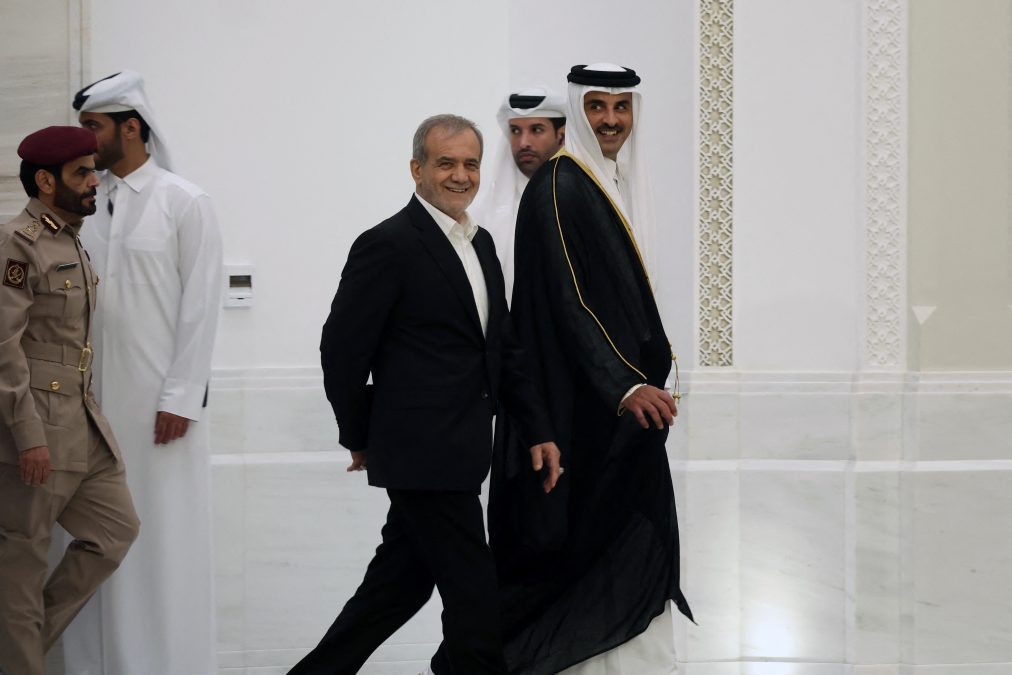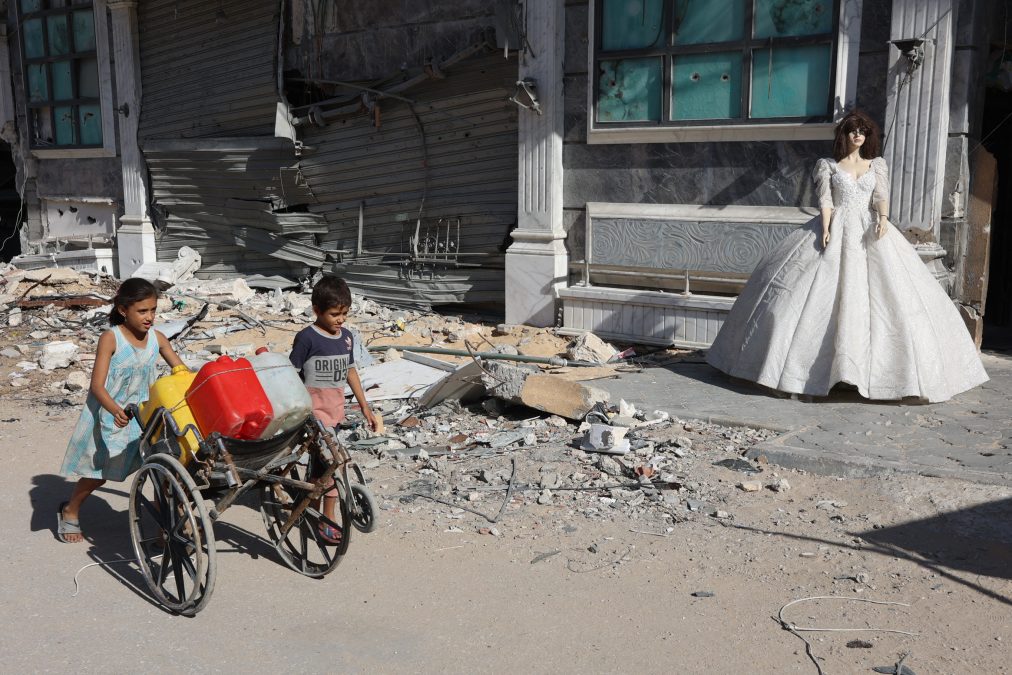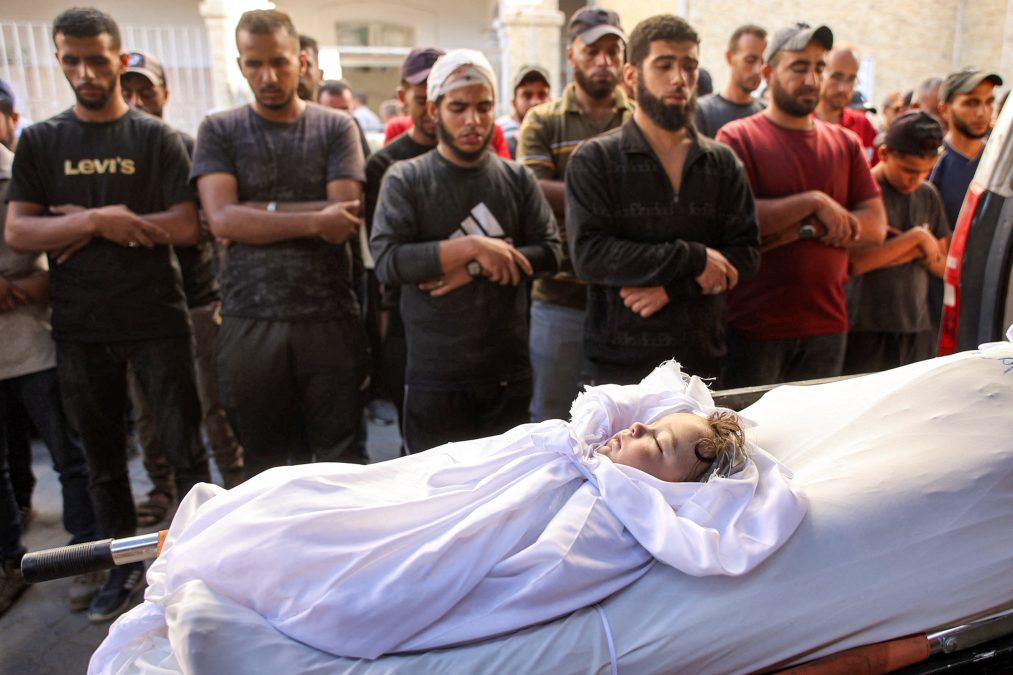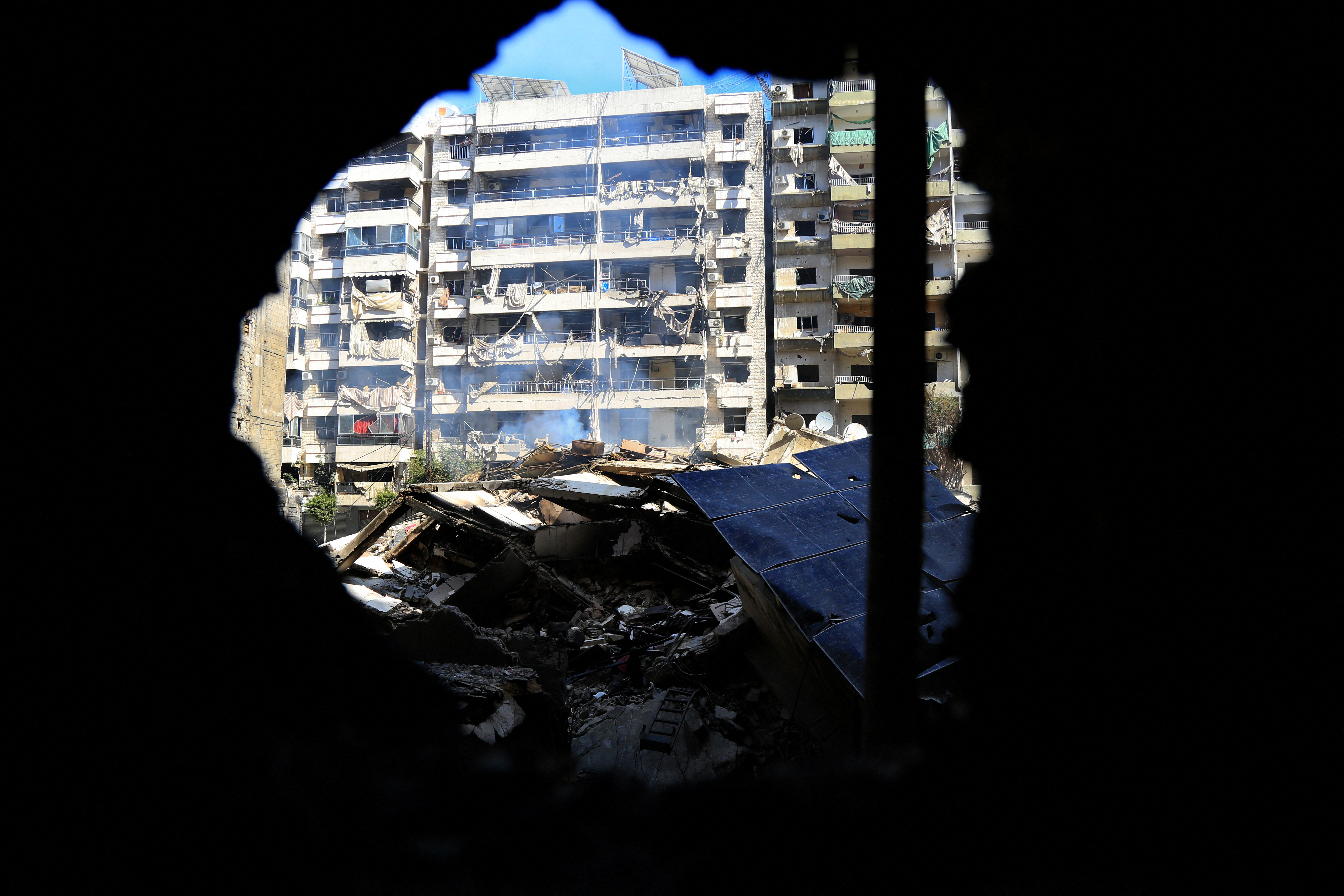Doha/Beirut — Iranian President Masoud Pezeshkian insisted Wednesday that Iran was “not looking for war” but pledged a stronger response if Israel retaliates for its missile attack.
“If it (Israel) wants to react, we will have a stronger response, this is what the Islamic Republic is committed to,” Pezeshkian said in a joint press conference with Qatar’s emir, Sheikh Tamim bin Hamad Al-Thani, in Doha.
“We are not looking for war, it is Israel that forces us to react,” he said.
Pezeshkian spoke a day after Iran fired about 200 missiles including hypersonic weapons towards Israel, sending frightened civilians into shelters.
On Wednesday the Israeli military said several Iranian missiles fell inside air force bases without causing any damage, while the Iranian military claimed 95% successful strikes. It’s against Israeli law to take or share photos and videos of any security-related incidents.
“The dirty goal of the Zionist regime is to cause insecurity and spread crisis in the region,” Pezeshkian said.
“What we want from US and European countries is to tell the entity they have planted in the region (Israel) to stop the bloodshed.”
Sheikh Tamim warned that Israel was drawing the region to the “brink of the abyss” with its attacks on Hezbollah in Lebanon.
QATAR-IRAN RELATIONS
Sheikh Tamim bin Hamad Al-Thani affirmed that his talks with the president of the sisterly Islamic Republic of Iran addressed areas of cooperation, noting that he and the Iranian President stressed the importance of exploring potential opportunities for cooperation between the two countries in the commercial and economic fields.

The Emir explained that the talks are being held in light of the delicate circumstances that the region is going through in terms of the Israeli aggression on Gaza, the West Bank, Al-Aqsa Mosque and Lebanon, pointing out that the martyrdom of thousands of people who were killed and wounded as a result of the aggression puts the entire region on the brink of the abyss, and leads to the expansion of the circle of violence in it.
The Emir affirmed the State of Qatar’s support for any regional or international efforts aimed at reducing escalation and maintaining stability and security in the region, explaining that the State of Qatar calls on the international community to take urgent action to compel the Israeli occupation authorities to stop their brutal aggression on the Gaza Strip and Lebanon.
The State of Qatar has warned of the recent escalation in Lebanon, since the beginning of the increasing Israeli aggression, indicating that it has worked intensively to reach a ceasefire and contain the conflict, stressing that de-escalation in light of these rapid developments means that the occupation army stops its unjust war on brothers in Gaza and the West Bank and its aggression on Lebanon.
Regarding mediation to cease fire, the Qatari leader affirmed the continuation of the State of Qatar’s efforts and endeavors to stop the war in Gaza and release the hostages and detainees, explaining that mediation is a strategic option for Qatar.
The Emir also stressed the importance of multiple mechanisms to develop relations between Qatar and Iran, noting that this is what Qatar is doing, and expressed the need to enhance cooperation and brotherhood between Islamic countries in general, highlighting that the cooperation between Qatar and Iran supports the stability and security of the region.
HEZBOLLAH STRIKES KILL EIGHT ISRAELI SOLDIERS
In Beirut, Hezbollah said it repelled an Israeli infiltration into southern Lebanon on Wednesday, as Israel reported eight soldiers were killed — its first losses since launching cross-border raids this week.
The clashes came hours after Iran launched its largest missile attack yet on Israel, its sworn enemy. Israeli Prime Minister Benjamin Netanyahu warned Tehran would pay for its “big mistake”.
US President Joe Biden ruled out supporting an Israeli strike on Iran’s nuclear sites, while Iranian President Masoud Pezeshkian again warned of a “stronger” response, though he stressed Iran was “not looking for war”.
Israel, shifting its focus from the Gaza war, is now trying to secure its border with Lebanon so tens of thousands of Israelis displaced by nearly a year of exchanges of fire with Hezbollah can return home.
A day after its military said it was conducting “targeted ground raids” in south Lebanon, Israel reported the first death of a soldier in the Israel-Hezbollah war, a toll that later rose to eight.
Hezbollah said it forced Israeli soldiers to retreat, targeted an Israeli unit with explosives and destroyed three Merkava tanks with rockets as they advanced on Maroun al-Ras village.
The Israeli army said it staged two brief incursions into Lebanon, warning residents to evacuate more than 20 areas.
In Beirut, Hezbollah targets in the southern suburbs were repeatedly bombarded overnight, with AFP correspondents hearing about 20 explosions and seeing smoke billowing over the area.

ATTACKS ON SYRIA
The Syrian Observatory for Human Rights war monitor said an Israeli strike on a Damascus neighborhood killed two people.
After the Iranian missile strikes, the Israeli administration reacted sharply.
“Iran made a big mistake tonight and will pay for it,” Israeli Prime Minister Netanyahu said.
“Whoever attacks us, we attack them.”
His defense minister, Yoav Gallant, echoed the warning.
“Iran has not learned a simple lesson — those who attack the state of Israel, pay a heavy price,” he said.
Iran’s armed forces chief of staff, Major General Mohammad Bagheri, threatened to fire “with bigger intensity” if Israel makes good on its pledge to retaliate.
Iran’s Revolutionary Guards said the missiles were fired in retaliation for Nasrallah’s killing alongside its Quds Force commander Abbas Nilforoushan, as well as Hamas leader Ismail Haniyeh in a Tehran bombing in July.
Lebanon’s disaster management agency said 1,873 people had died since Israel and Hezbollah began trading fire after the Hamas attacks on October 7, displacing hundreds of thousands.
President Joe Biden said the United States was “fully supportive” of Israel after the missile attack.
Pentagon chief Lloyd Austin condemned an “outrageous act of aggression” by Iran, while Biden’s National Security Advisor Jake Sullivan told reporters there would be “severe consequences”.
The conflict is now expected to escalate, with analyst Jordan Barkin saying: “This will not end well.
“Netanyahu has a long history of fighting back strongly and quickly when provoked. Restraint is not Mr. Netanyahu’s strong suit.”
James Demmin-De Lise, an analyst who writes for The Times of Israel newspaper, agreed.
“I think we’ll see Israel launch decisive attacks against Iran. Likely with the hope of toppling the Islamic regime,” he said.
But some Israelis expressed fatigue with the war, with Tel Aviv resident Liron Yori, 22, saying: “I feel very, very disappointed. I see where the war’s going and I don’t feel comfortable with it.”
In central Beirut, people were weary and afraid, though some Hezbollah supporters were defiant.
Youssef Amir, displaced from southern Lebanon, said: “I have lost my home and relatives in this war, but all of that is a sacrifice for Lebanon, for Hezbollah”.
Iran’s missile attack, its second on Israel in six months, triggered widespread global alarm, as well as a spike in world oil prices.
UN chief Antonio Guterres condemned the Iranian attack on Israel, saying they “do nothing to support the cause of the Palestinian people”.
The G7 group of rich nations vowed to work together to reduce tensions in the region and said a diplomatic solution was “still possible”.
Since October 7, 2023, Israel’s military offensive has killed at least 41,689 people in Gaza, the majority of them civilians, according to figures provided by the Gaza health ministry, and confirmed by the United Nations.
JORDAN WARNING
In Amman, Jordan’s top diplomat Ayman Safadi warned Israel and Iran on Wednesday that the country will “defend itself with all its capabilities against any threat” after Iranian missiles fired at Israel breached the kingdom’s airspace.
“Jordan will not be anyone’s battlefield,” Safadi said in a phone call with his British counterpart David Lammy, according to a ministry statement.
The country would “defend itself with all its capabilities against any threat to its security, its stability and the safety of its citizens”, he added, saying “Jordan has clearly informed Iran and Israel of this stance”.
Israel has promised to retaliate after Iran launched around 200 missiles at Israel on Tuesday in response to the killings of Hezbollah and Hamas leaders.
The Jordanian Public Security Directorate said after the attack its air force and air defenses had intercepted missiles and drones.
The interior ministry said a number of people suffered minor injuries from falling debris.
Safadi called for ceasefire agreements in both Gaza and Lebanon to “stop this dangerous escalation” in the Middle East.
ISRAEL BANS THE HEAD OF UNITED NATIONS
Earlier Wednesday, Israel had declared Antonio Guterres “persona non grata” for failing to specifically condemn Iran’s missile attack when he condemned on Tuesday the “broadening conflict in the Middle East.”
“Anyone who cannot unequivocally condemn Iran’s heinous attack on Israel does not deserve to step foot on Israeli soil,” said Foreign Minister Israel Katz in a statement.
Guterres addressed the diplomatic dust-up at the Security Council, saying “as should have been obvious yesterday in the context of the condemnation I expressed, I again strongly condemn yesterday’s massive missile attack by Iran on Israel.”
The UN chief also reiterated his call for a ceasefire.
“Since last October, Israel has conducted in Gaza the most deadly and destructive military campaign in my years as secretary-general,” he said.
“Simultaneously armed Palestinian groups have also used violence. Hamas has continued to launch rockets,” he said, adding Iran’s missile attack did “nothing to support the cause of the Palestinian people or reduce their suffering.”

MORE DEATH AND DESTRUCTION IN PALESTINE
Israeli forces on Wednesday evening shelled a house in Gaza City, killing a child and injuring two people and bringing the death toll in the Strip since dawn Wednesday to 90, including children and women, according to the Palestinian Red Crescent Society (PRCS).
The PRCS announced that a child was killed and two other civilians were injured when the occupation forces shelled a house of the Al-Helou family, near the Palestine Bank in the Tel Al-Hawa neighborhood, southwest of Gaza City.
It added that the fatality along with the casualties were transferred to the Arab Baptist Hospital in the city.
Earlier today, 10 civilians were killed and 27 others were injured in Israeli airstrikes on the Nuseirat and Al-Bureij refugee camps in the central Strip.
Three civilians were also killed in raid on the destroyed town of Khuza’a, east of Khan Younis, in the southern Strip.
Meanwhile, the Israeli forces committed a new massacre in Khan Younis, killing over 40 civilians, mostly women and children, and injuring dozens.
Medical sources reported that medical crews retrieved the bodies of fatalities from the rubble following intensive air strikes that targeted the southeastern areas of Khan Younis, including the neighborhoods of Maan, Qizan al-Najjar, and al-Manara.
In the morning hours Wednesday, nine civilians were killed and about 20 others were injured in Israeli aerial bombardment of a school and an orphanage housing displaced people in Gaza City.
Local sources said that the Israeli aircrafts bombed the Muscat School, which housed displaced people in the al-Zarqa area of the al-Tuffah neighborhood in Gaza City, killing three civilians and injuring 17 others.
Six more civilians were also killed and others were injured when the Israeli forces bombed the Al-Amal Orphanage, which houses displaced people west of Gaza City.
Israel has proceeded with its genocidal offensive on the war-torn Strip in complete disregard of the International Court of Justice (ICJ), which ordered Israel in a legally binding decision to halt its military offensive in Rafah, which may violate its obligations under the Genocide Convention.
Israel has been waging a devastating war on Gaza since October 7, killing at least 41,689 Palestinians and injuring 96,625 others.
Moreover, at least 10,000 people are unaccounted for, presumed dead under the rubble of their homes throughout the Strip.
Palestinian and international organizations say that the majority of those killed and wounded are women and children.
The Israeli aggression has also resulted in the forceful displacement of nearly two million people from all over the Gaza Strip, with the vast majority of the displaced forced into the densely crowded southern city of Rafah near the border with Egypt – in what has become Palestine’s largest mass exodus since the 1948 Nakba.
(With inputs from Qatar News Agency and Palestine’s Wafa News Agency)








